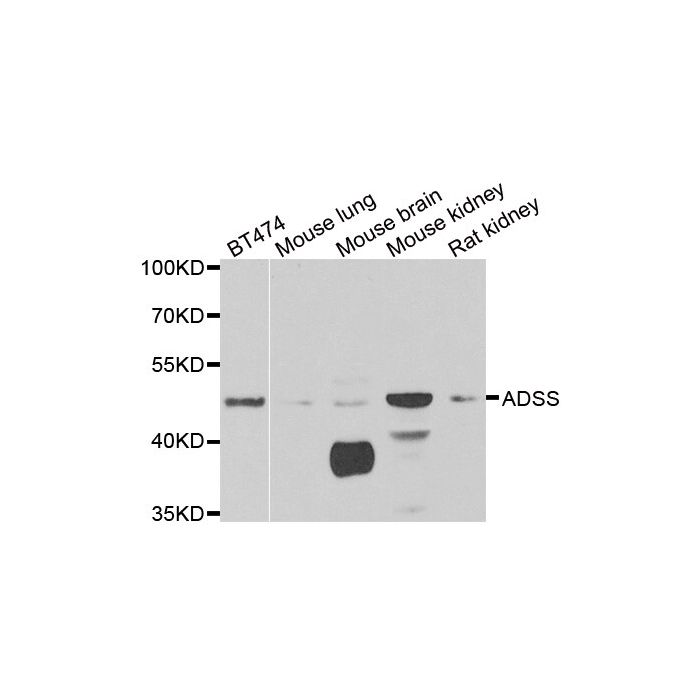ADSS polyclonal, anti-human, mouse, rat
€388.00
In stock
SKU
BS6316
Background:
Cellular signal transduction pathways are initiated by the binding of external signals, such as steroids, charged-small molecules or proteins, to their respective receptors. These signaling pathways are important in eliciting a cellular response to external stimuli. Proteins involved in signaling pathways may have several different regulatory and/or enzymatic functions, including recruitment, activation, phosphorylation, maintenance and transport. Mutations in these pathways may be implicated in a variety of diseases, suggesting that these intermediary proteins may be potential therapeutic targets. Adenylosuccinate synthetase 2 (AdSS2 or AMPSase 2) is important in the AMP biosynthesis pathway (purine nucleotide biosynthesis). It is a cytoplasmic protein that belongs to the adenylosuccinate synthetase family of proteins. AdSS2 can form homodimers.
Alternative Name:
Adenylosuccinate synthetase isozyme 2, AMPSase 2, AdSS 2, Adenylosuccinate synthetase, acidic isozyme, Adenylosuccinate synthetase, liver isozyme, L-type adenylosuccinate synthetase, IMP--aspartate ligase 2, ADSS, ADSS2
Application Dilution: WB: 1:500~1:2000, IF: 1:50~1:200
Specificity: ADSS polyclonal antibody detects endogenous levels of ADSS protein.
Immunogen:
Recombinant full length Human ADSS.
MW: ~ 50 kDa
Swis Prot.: P30520
Purification & Purity:
The antibody was affinity-purified from rabbit antiserum by affinity-chromatography using epitope-specific immunogen and the purity is > 95% (by SDS-PAGE).
Format:
1mg/ml in PBS with 0.1% Sodium Azide, 50% Glycerol.
Storage:
Store at 4°C short term. Aliquot and store at -20°C long term. Avoid freeze-thaw cycles.
For research use only, not for use in diagnostic procedure.
Cellular signal transduction pathways are initiated by the binding of external signals, such as steroids, charged-small molecules or proteins, to their respective receptors. These signaling pathways are important in eliciting a cellular response to external stimuli. Proteins involved in signaling pathways may have several different regulatory and/or enzymatic functions, including recruitment, activation, phosphorylation, maintenance and transport. Mutations in these pathways may be implicated in a variety of diseases, suggesting that these intermediary proteins may be potential therapeutic targets. Adenylosuccinate synthetase 2 (AdSS2 or AMPSase 2) is important in the AMP biosynthesis pathway (purine nucleotide biosynthesis). It is a cytoplasmic protein that belongs to the adenylosuccinate synthetase family of proteins. AdSS2 can form homodimers.
Alternative Name:
Adenylosuccinate synthetase isozyme 2, AMPSase 2, AdSS 2, Adenylosuccinate synthetase, acidic isozyme, Adenylosuccinate synthetase, liver isozyme, L-type adenylosuccinate synthetase, IMP--aspartate ligase 2, ADSS, ADSS2
Application Dilution: WB: 1:500~1:2000, IF: 1:50~1:200
Specificity: ADSS polyclonal antibody detects endogenous levels of ADSS protein.
Immunogen:
Recombinant full length Human ADSS.
MW: ~ 50 kDa
Swis Prot.: P30520
Purification & Purity:
The antibody was affinity-purified from rabbit antiserum by affinity-chromatography using epitope-specific immunogen and the purity is > 95% (by SDS-PAGE).
Format:
1mg/ml in PBS with 0.1% Sodium Azide, 50% Glycerol.
Storage:
Store at 4°C short term. Aliquot and store at -20°C long term. Avoid freeze-thaw cycles.
For research use only, not for use in diagnostic procedure.
| Is Featured? | No |
|---|
Write Your Own Review

